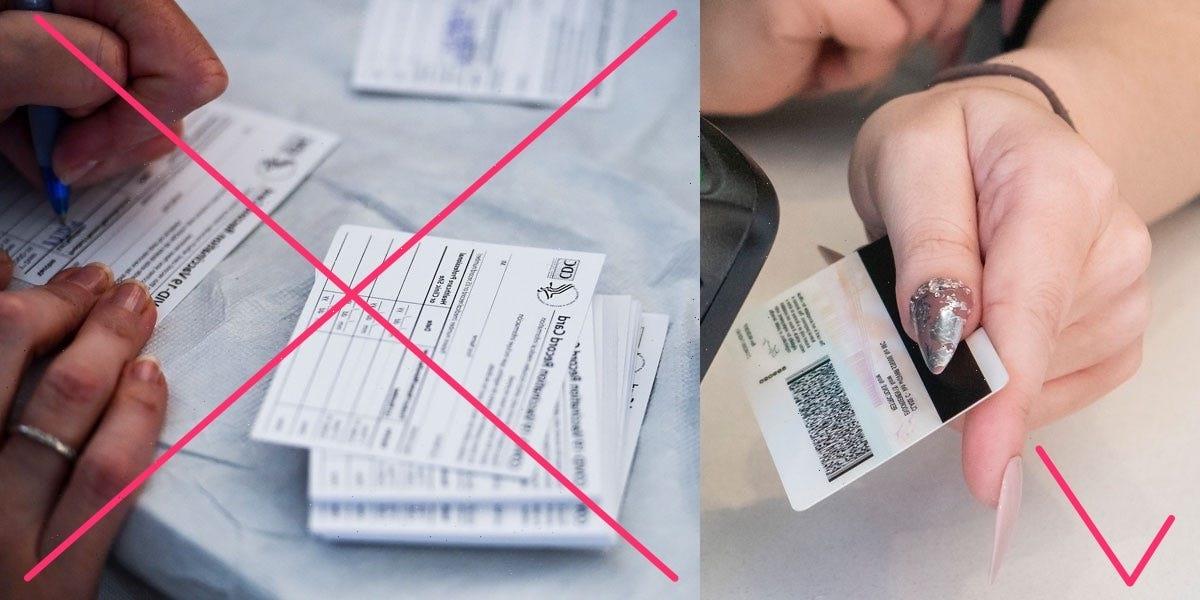- The CDC’s COVID-19 vaccine cards are subject to fraud, and too big to carry around.
- A top bioethicist says we should get DMV-style licenses for vaccination, with a QR code.
- See more stories on Insider’s business page.
Dr. Ezekiel Emanuel is ready to step out and party — well, almost.
The chair of the department of medical ethics and health policy at the University of Pennsylvania hasn’t been to the theater in over a year and he says he’s “dying to go.” He’s also planning to travel to Switzerland this summer.
But first, he has to sort out a big open question — both for himself, and for anyone he’s going to share some air with.
“How am I supposed to prove that I’ve been vaccinated?” he asks. “What I have now is a CDC cardboard piece of paper, right? It’s ridiculous.”
Emanuel says it shouldn’t be so hard for authorities to develop a reliable, relatively fraud-proof and secure driver’s license-style verification system for gauging COVID-19 immunity status. Ideally, such a system could replace the Centers for Disease Control and Prevention’s white vaccine cards, which are both easy to fabricate and too big to fit in standard wallets.
A vaccine license from the DMV?
Ezekiel, a former White House health policy advisor, imagines a world where “I could just have a QR code, and show it, and it would flash green,” offering permission to do all sorts of indoor activities in a secure, encrypted, and private way. It sounds like the kind of thing the DMV could pop onto a credit card-sized ID and print out.
“So, perhaps the DMV should have been in control of this?” I asked him, as I imagined the ensuing bureaucratic headaches.
“Look, you’re laughing, but … we know how to print those things,” he said.
The idea of COVID-19 immunity licensure is something he’s been considering since at least May 2020, when he wrote a viewpoint submitted to the medical journal JAMA on the subject.
“People must be allowed to pursue their life plans unless doing so is incompatible with public health,” he said at the time. “In the absence of licensing, businesses and individuals may instead elect to use unregulated evidence of immunity, such as test results, or to use assumptions about immunity or vulnerability that are likely to be arbitrary and biased.”
‘I want to know that everyone at work who’s going to be in a closed room with me is going to be vaccinated’
At a time when herd immunity is far from accomplished in the US, licensure is the kind of safeguard that could allow people to do more together, without as much risk of getting sick.
“I want to know that everyone at work who’s going to be in a closed room with me is going to be vaccinated,” Emanuel said. “I’d love to go to the theater, but I also would love to go to the theater safely and knowing that everyone in the theater is vaccinated — you’re not allowed in the theater unless you’re vaccinated, or had COVID.”
Some US universities and hospital systems (like his) have started mandating COVID-19 vaccination for students and staff, but it is far from the norm for businesses or events nationwide yet. No US states have any requirement for hospital staff to be COVID-19 vaccinated, but that could change if and when vaccines receive a full Food and Drug Administration approval. Already, a majority of healthcare workers nationwide are required to get annual flu shots.
“If anything, this vaccine is better, safer, and forestalls a worse disease than the influenza vaccine, and yet fewer are mandating it,” Emanuel said. “I think that’s unethical.”
Unvaccinated people could still be accommodated
Much like the DMV does for driver’s licenses, COVID licenses could come with different designations and exemptions.
In fact, digital immunity cards that are similar to what Emanuel imagines already exist in some places.
New York has an “Excelsior Pass” app that operates with a QR code. It shows proof of vaccination or negative test results, which can be scanned like a boarding pass at businesses or venues (it’s already being used at the Barclays Center and Madison Square Garden in New York City.)
The European Union has a “Digital COVID Certificate,” which allows people to travel more freely by showing a QR code proving they’ve either been vaccinated, gotten a negative test result, or recovered from the virus. The new system is up and running in seven EU countries so far.
There might need to be different kinds of licensure for people with natural immunity from infection (versus vaccination), and special dispensations for immunocompromised individuals who don’t benefit from vaccines in the same way as others do, Ezekiel said. The unvaccinated need not be categorically excluded.
“You wear an N95 mask, or, we accommodate you in working from home. I mean, look, we have laws that mean you have to make reasonable accommodations for people,” he said. “These aren’t new problems.”
Even if there was a clear, secure system for keeping track of immunity, there’s still one big mystery left to settle. Scientists haven’t yet figured out how, exactly, immunity to the coronavirus works. They don’t know when a COVID-19 license might expire, or how will we know if it has.
“We’re uncertain what the expiration date is, right? All the more reason to have it electronically, where we can change them,” Emanuel said.
Source: Read Full Article
